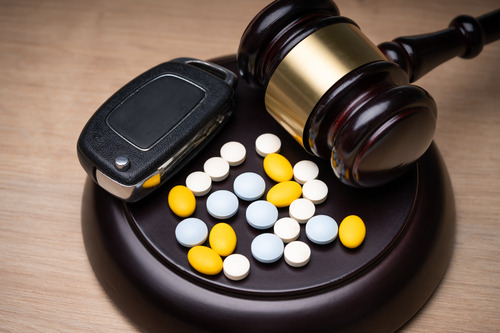At Asheville DUI Guy, we focus exclusively on defending individuals facing DUI charges. Our attorneys possess in-depth knowledge of North Carolina’s DUI laws and the local court system, enabling us to craft effective defense strategies. Serving Asheville and the surrounding areas, we strive to protect your rights and achieve the most favorable outcome in your case.
Getting a DUI for drugs in North Carolina is serious. Whether the drug is illegal, prescribed, or over-the-counter, if it affects your ability to drive safely, you can be charged with impaired driving. Law enforcement and the courts treat drug impaired driving the same as alcohol-related DUIs, and the penalties can be just as severe.
In this blog, you’ll learn how North Carolina handles DUI for drugs charges, what substances count as impairing, how law enforcement builds a case, and what penalties you could face, concluding with why working with an experienced Asheville DUI defense lawyer is important to protect your rights.
What Counts as an “Impairing Substance” in NC Law
In North Carolina, a driver can be charged with a DUI for drugs even if the substance in their system is legal. The law focuses on whether the substance impaired the person’s ability to operate a motor vehicle safely.
Legal Definition of “Impairing Substance”
Under North Carolina General Statute § 20-4.01(14a), an “impairing substance” is defined as alcohol, a controlled substance, or any other substance that could impair a person’s physical or mental faculties. This definition includes prescription drugs, over-the-counter medications, and illegal drugs. The law does not distinguish between legal and illegal use; it only asks if the driver’s system contained something that affected their ability to drive safely.
Common Substances That Lead to DUI Drug Charges
Drug impaired driving charges can result from a wide range of substances. These include marijuana (THC), opioids, benzodiazepines, sleep aids, antidepressants, and anti-anxiety medications. Even lawfully prescribed drugs can lead to a DUI charge if they impair driving. Illicit drugs such as cocaine, methamphetamine, or heroin are also common causes of drug DUI cases in North Carolina.
Combining Substances Increases Risk and Legal Consequences
Drivers who have two or more drugs in their system, or who mix prescription drugs with alcohol, are at a higher risk of impaired driving and legal penalties. This combination can severely reduce psychomotor skills and cognitive functions, leading to unsafe operation of a motor vehicle and potential involvement in motor vehicle crashes. The presence of multiple substances often leads law enforcement officers to pursue more serious charges.
Focus on Impairment, Not Legality
North Carolina DUI laws do not require proof that the substance was illegal. The key factor is whether the drug or impairing substance reduced the driver’s ability to drive safely. Even if a person has a lawful prescription, they can still be found guilty of driving under the influence if evidence shows impairment.
Law Enforcement Looks for Signs of Drug Impairment
During a traffic stop, officers will assess whether a driver appears impaired. This includes behavior, field sobriety tests, and signs of drug use. If officers suspect drug impaired driving, they may request a chemical test or bring in a drug recognition expert. Testing positive for any controlled substance can support a DUI conviction based on impairment, even if the drug was prescribed.
How Law Enforcement Determines Drug Impairment
Law enforcement officers use a series of steps to decide whether a driver is under the influence of drugs. These steps focus on signs of impairment, not just the presence of drugs in the driver’s system.
Observations During the Traffic Stop
The process begins with the traffic stop. Officers look for lane tracking issues, delayed reaction times, drifting, or failure to obey traffic signals. These behaviors may suggest that the driver is under the influence of drugs or another impairing substance. If the officer suspects drug impaired driving, the stop will escalate to further investigation.
Field Sobriety Tests and Drug Indicators
Officers may conduct standardized field sobriety tests (SFSTs) to check for signs of impaired driving. These tests were designed for alcohol impairment, but officers also use them in DUI drug cases. The tests check psychomotor skills, balance, coordination, and attention. Poor performance may lead to a DUI charge for drugs, even if the person did not consume alcohol.
Drug Recognition Evaluation (DRE)
If impairment is suspected and alcohol is ruled out, a specially trained drug recognition expert (DRE) may perform a Drug Recognition Evaluation. This 12-step process includes checking pupil size, body temperature, pulse, and muscle tone. The DRE also interviews the driver and observes behavior to determine if the person is under the influence of drugs such as marijuana, opioids, cocaine, or other drugs.
Chemical Testing for Drugs
Unlike alcohol, there is no legal limit for drugs in North Carolina. A driver can be charged based on behavior and impairment, not just test results. However, officers may still request a blood or urine test to confirm the presence of a controlled substance. Testing helps show what substances were in the driver’s system, but it does not measure how impaired the driver was.
Officer’s Report Supports the DUI Charge
The arresting officer’s report is critical in DUI drug cases. It includes all observations, test results, and any statements made by the driver. This report often becomes key evidence in court. If the officer believes the driver was drug impaired, that opinion, combined with other evidence, can support a DUI conviction based on drug use.
DUI for Prescription Drugs: Yes, You Can Be Charged
Drivers often assume that a valid prescription protects them from a DUI charge. In North Carolina, that is not the case. If a prescription drug impairs your ability to drive, you can be charged with driving under the influence.
Legal Medications Can Still Be Impairing Substances
Under North Carolina law, the key issue is impairment, not whether the drug was legal. Prescription drugs, even when taken as directed, can act as impairing substances if they affect your ability to operate a motor vehicle safely. This includes common medications for pain, anxiety, sleep, and depression.
Lawful Prescription Does Not Equal Legal Driving
A lawful prescription is not a defense against a DUI charge if the drug affected your cognitive functions, psychomotor skills, or alertness. Many drivers don’t realize their medication can interfere with their ability to drive safely, especially when starting a new drug or increasing the dose.
Mixing Medications or Combining With Alcohol Increases Risk
Drivers who combine two or more drugs, or take prescription drugs with alcohol, face a higher risk of impairment. These combinations can severely reduce reaction time and attention, leading to motor vehicle crashes. In these cases, law enforcement officers may pursue serious criminal charges even if each substance was taken legally.
Officers Rely on Behavior and Test Results
If a driver shows signs of drug impaired driving, such as swerving or slow responses, officers may conduct field sobriety tests. A drug recognition evaluation may follow. If the driver fails these tests and has prescription drugs in his or her system, a DUI for drugs charge is likely.
You Can Be Convicted Without Illegal Drug Use
A DUI conviction based on prescription drug use is legally possible in North Carolina. The law does not require the presence of illegal drugs. It requires proof that the substance impaired the driver’s ability to operate a motor vehicle. This is why many drug DUI cases involve people with no history of illicit drug use at all.
Penalties and Legal Consequences of a DUID in North Carolina
A DUI for drugs in North Carolina carries the same legal weight as an alcohol-related DUI. Penalties can be severe, even for first-time offenders.
DUID is Charged Under the Same Statute as Alcohol DUI
Driving under the influence of drugs is prosecuted under North Carolina General Statute § 20-138.1, the same statute used for alcohol DUIs. The law does not separate drugged driving from drunk driving. If a driver is impaired by prescription drugs, illegal drugs, or other impairing substances, they face the same criminal consequences.
Levels of Punishment Based on Aggravating Factors
North Carolina uses a level system to determine punishment. Levels I through V apply based on factors like prior convictions, driving with a minor in the car, or causing a crash. Penalties can include:
- Jail time from 24 hours up to 2 years
- Fines ranging from $200 to $4,000
- Substance abuse assessments and treatment
- Probation and community service
A DUI drug case with aggravating factors like repeat offenses or fatal crashes may lead to harsher sentencing.
Driver’s License Suspension or Revocation
A DUI conviction results in an automatic driver’s license suspension. A first offense leads to a one-year revocation. Refusing a chemical test during a traffic stop also triggers a one-year suspension under G.S. § 20-16.2, even before a conviction.
Long-Term Legal and Personal Impact
A DUI for drugs can affect employment, insurance rates, and future criminal charges. North Carolina treats impaired drivers seriously, whether the impairing substance is alcohol, marijuana, or a controlled substance. The conviction stays on your record and may be used to enhance penalties for future offenses.
Defense Is Critical in Drug DUI Cases
Due to the strict consequences, building a strong DUI defense is essential. DUI drug cases often involve subjective observations and non-specific tests. An experienced attorney can challenge the evidence, the arrest process, or the findings of a drug recognition evaluation. A solid defense can reduce or eliminate penalties in some cases.
Contact an Experienced Asheville DUI Defense Attorney Today!
If you’ve been charged with a DUI for drugs in North Carolina, don’t face it alone. Our team at Asheville DUI Guy has the experience to challenge the evidence, protect your license, and fight for the best possible outcome.
Contact us at 828-759-5556 for a free case consultation today!







